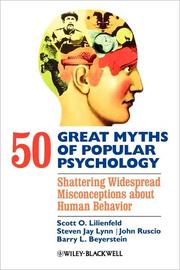| Listing 1 - 2 of 2 |
Sort by
|
Book
ISBN: 9789035135697 Year: 2010 Publisher: Amsterdam Bakker
Abstract | Keywords | Export | Availability | Bookmark
 Loading...
Loading...Choose an application
- Reference Manager
- EndNote
- RefWorks (Direct export to RefWorks)
Gebruiken we maar 10 procent van onze hersencapaciteit? Worden baby's slimmer als u ze naar Mozart laat luisteren? Hebben dromen een symbolische betekenis? Kan hypnose u helpen om u bepaalde dingen weer te herinneren? Bestaat de bijna-doodervaring? De pers, kwakzalvers en internet voorzien het publiek van een constante stroom aan populair-psychologische weetjes, maar hoe onderscheiden we feit van fictie? En wat als alom geaccepteerde informatie ineens onwaar blijkt te zijn? In 'De vijftig grootste misvattingen in de psychologie' worden veel misverstanden op een grondige en vooral toegankelijke en fascinerende manier ontrafeld.
159.9 --- 410.3 --- Psychologie --- Verzamelde opstellen psychologie. --- Verzamelde opstellen psychologie --- Gedragspsychologie --- Man --- Volwassene --- 410 --- psychologie

ISBN: 9781405131124 9781405131117 140513111X 1405131128 Year: 2015 Publisher: Chichester Wiley-Blackwell
Abstract | Keywords | Export | Availability | Bookmark
 Loading...
Loading...Choose an application
- Reference Manager
- EndNote
- RefWorks (Direct export to RefWorks)
In a society in which psychological knowledge is shaped as much, if not more, by supermarket tabloids, talk shows, and self-proclaimed "self-help gurus" as it is by the latest scientific advances, here is a book that helps students and the public distinguish fact from fiction in the world of psychology. The authors use popular myths as a vehicle for distinguishing science from pseudoscience. Organized around key topic areas of modern psychology such as brain functioning, perception, development, memory, emotion, intelligence, learning, personality, mental illness, and psychotherapy, this book will help students and laypersons to critically evaluate the information and misinformation that is generated by popular psychology.--From publisher description
159.9 --- #KVHB:Algemene psychologie --- #KVHB:Gedrag --- 415 --- 415.2 --- gedragspsychologie --- mythen --- Algemene psychologie --- algemene psychologie, zintuiglijke indrukken en waarnemingen --- Human behavior --- Psychology --- Action, Human --- Behavior, Human --- Ethology --- Human action --- Human beings --- Human biology --- Physical anthropology --- Social sciences --- Psychology, Comparative --- Behavior --- Human behavior. --- Psychology - Popular works
| Listing 1 - 2 of 2 |
Sort by
|

 Search
Search Feedback
Feedback About UniCat
About UniCat  Help
Help News
News